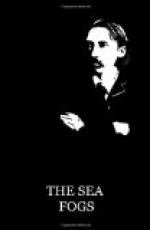Stevenson was married May 19, 1880. His health, which had delayed the marriage, determined the character of the honeymoon. He must get away from the coast and its fogs. His honeymoon experiences are recorded in one of the most delightful of his minor writings, “The Silverado Squatters.” He went, with his wife, his stepson and a dog, to squat on the eastern shoulder of Mount Saint Helena, a noble mountain which closes and dominates the Napa Valley, a wonderful and fertile valley, running northward from the bay of San Francisco. Silverado was a deserted mining-camp. Stevenson has intimated that there are more ruined cities in California than in the land of Bashan, and in one of these he took up his residence for about two months, “camping” in the deserted quarters of the extinct mining company. Had he gone a little beyond the toll-house, just over the shoulder of the mountain, he would probably never have seen the glory of “the sea fogs.” It would have been better for his health but worse for English literature.
My first knowledge of that glory came to me twenty years ago. I had come to California to care for one dearly beloved by me, who was fighting the same fight that Stevenson fought, and against the same enemy, and who was fighting it just as bravely. I took him to the summit of the Santa Cruz Mountains in the hope that we might escape the fogs. As I watched on the porch of the little cottage where he lay, I saw night after night what I believe to be the most beautiful of all natural phenomena, the sea fog of the Pacific, seen from above. Under the full moon, or under the early sun which slowly withers it away, the great silver sea with its dark islands of redwood seemed to me the most wonderful of things. With my wonder and delight, perhaps making them more poignant, was the fear lest the glory should mount too high, and lay its attractive hand on my beloved. The fog has been dear to me ever since. I have often grumbled at it when I was in it or under it, but when I have seen it from above, that first thrill of wonder and delight has come back to me - always. Whether on the Berkeley hills I see its irresistible columns moving through the Golden Gate across the bay to take possession of the land, or whether I stand on the height of Tamalpais and look at the white, tangled flood below, —
“My heart leaps up when I behold.”
It remains to me —
“A vision, a delight and a desire.”
When the beauty of the fog first got hold of me, I wondered whether any one had given literary expression to its supreme charm. I searched the works of some of the better-known California poets, not quite without result. I was familiar with what seem to me the best of the serious verses of Bret Harte, the lines on San Francisco, — wherein the city is pictured as a penitent Magdalen, cowled in the grey of the Franciscans, - the soft pale grey of the sea fog. The literary value of the figure is hardly injured by the cold fog that the penitence of this particular Magdalen has never been of an enduring quality. It is to be noted that what Harte speaks of is not the beauty of the fog, but its sobriety and dignity.




